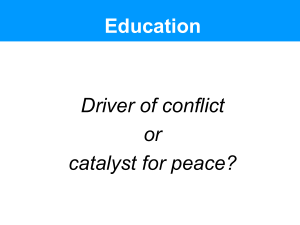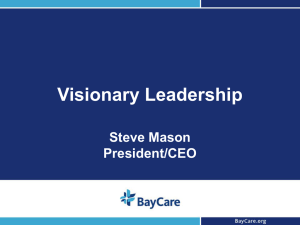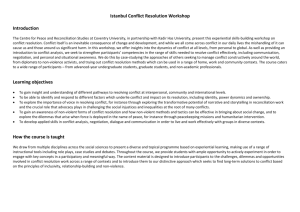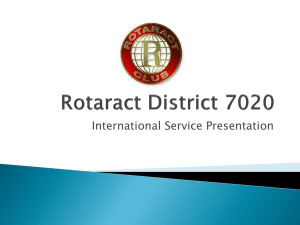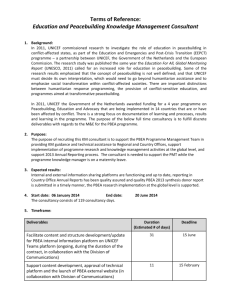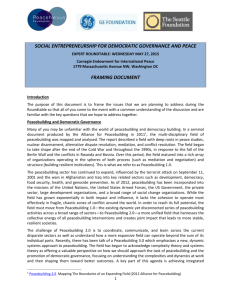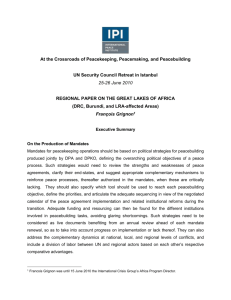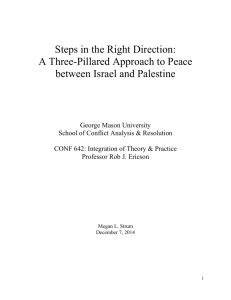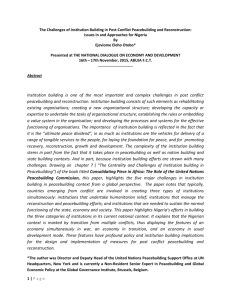Talk-by-Anne-Turnbul.. - University of Bradford
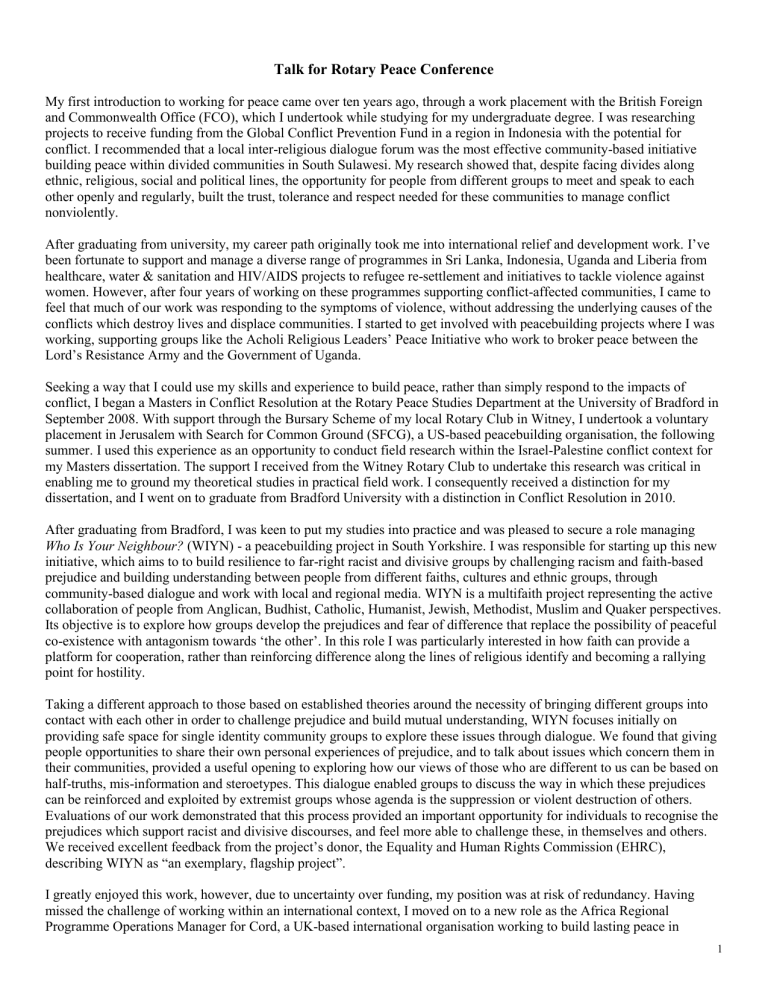
Talk for Rotary Peace Conference
My first introduction to working for peace came over ten years ago, through a work placement with the British Foreign and Commonwealth Office (FCO), which I undertook while studying for my undergraduate degree. I was researching projects to receive funding from the Global Conflict Prevention Fund in a region in Indonesia with the potential for conflict. I recommended that a local inter-religious dialogue forum was the most effective community-based initiative building peace within divided communities in South Sulawesi. My research showed that, despite facing divides along ethnic, religious, social and political lines, the opportunity for people from different groups to meet and speak to each other openly and regularly, built the trust, tolerance and respect needed for these communities to manage conflict nonviolently.
After graduating from university, my career path originally took me into international relief and development work. I’ve been fortunate to support and manage a diverse range of programmes in Sri Lanka, Indonesia, Uganda and Liberia from healthcare, water & sanitation and HIV/AIDS projects to refugee re-settlement and initiatives to tackle violence against women. However, after four years of working on these programmes supporting conflict-affected communities, I came to feel that much of our work was responding to the symptoms of violence, without addressing the underlying causes of the conflicts which destroy lives and displace communities. I started to get involved with peacebuilding projects where I was working, supporting groups like the Acholi Religious Leaders’ Peace Initiative who work to broker peace between the
Lord’s Resistance Army and the Government of Uganda.
Seeking a way that I could use my skills and experience to build peace, rather than simply respond to the impacts of conflict, I began a Masters in Conflict Resolution at the Rotary Peace Studies Department at the University of Bradford in
September 2008. With support through the Bursary Scheme of my local Rotary Club in Witney, I undertook a voluntary placement in Jerusalem with Search for Common Ground (SFCG), a US-based peacebuilding organisation, the following summer. I used this experience as an opportunity to conduct field research within the Israel-Palestine conflict context for my Masters dissertation. The support I received from the Witney Rotary Club to undertake this research was critical in enabling me to ground my theoretical studies in practical field work. I consequently received a distinction for my dissertation, and I went on to graduate from Bradford University with a distinction in Conflict Resolution in 2010.
After graduating from Bradford, I was keen to put my studies into practice and was pleased to secure a role managing
Who Is Your Neighbour?
(WIYN) - a peacebuilding project in South Yorkshire. I was responsible for starting up this new initiative, which aims to to build resilience to far-right racist and divisive groups by challenging racism and faith-based prejudice and building understanding between people from different faiths, cultures and ethnic groups, through community-based dialogue and work with local and regional media. WIYN is a multifaith project representing the active collaboration of people from Anglican, Budhist, Catholic, Humanist, Jewish, Methodist, Muslim and Quaker perspectives.
Its objective is to explore how groups develop the prejudices and fear of difference that replace the possibility of peaceful co-existence with antagonism towards ‘the other’. In this role I was particularly interested in how faith can provide a platform for cooperation, rather than reinforcing difference along the lines of religious identify and becoming a rallying point for hostility.
Taking a different approach to those based on established theories around the necessity of bringing different groups into contact with each other in order to challenge prejudice and build mutual understanding, WIYN focuses initially on providing safe space for single identity community groups to explore these issues through dialogue. We found that giving people opportunities to share their own personal experiences of prejudice, and to talk about issues which concern them in their communities, provided a useful opening to exploring how our views of those who are different to us can be based on half-truths, mis-information and steroetypes. This dialogue enabled groups to discuss the way in which these prejudices can be reinforced and exploited by extremist groups whose agenda is the suppression or violent destruction of others.
Evaluations of our work demonstrated that this process provided an important opportunity for individuals to recognise the prejudices which support racist and divisive discourses, and feel more able to challenge these, in themselves and others.
We received excellent feedback from the project’s donor, the Equality and Human Rights Commission (EHRC), describing WIYN as “an exemplary, flagship project”.
I greatly enjoyed this work, however, due to uncertainty over funding, my position was at risk of redundancy. Having missed the challenge of working within an international context, I moved on to a new role as the Africa Regional
Programme Operations Manager for Cord, a UK-based international organisation working to build lasting peace in
1
partnership with people affected by conflict. Winner of the 2010 Coventry International Prize for Peace and
Reconciliation, Cord works with local non governmental organisations and community groups in Africa and Asia. Our strategic focus is to develop the capacity of these local groups to deliver programmes which ensure that human rights are realised, that the peacebuilding potential of relief and development work is maximised, and that conflicts are transformed without recourse to violence.
I am deeply committed to working with grass-roots groups to help them effect change. In my free time, I am a volunteer facilitator for Turning The Tide (TTT), a Quaker Peace and Social Witness (QPSW) programme which works with
Quakers and campaigning and activist groups to advance their understanding of active nonviolence and its use for positive social change. Most of these workshops are in the UK, however, following the violence that marked the results of elections in Kenya in 2007, QPSW was invited by Kenyan Quakers to help teach nonviolent methods of working for change. Given my experience of working in East Africa, the TTT programme offered me the opportunity to lead training of trainers (ToT) workshops for young community volunteers and social change activists in Nairobi, Kenya, on a voluntary basis. Seeing this group of young people’s energy and commitment to affecting change, within their context of violent conflict driven by ethnic division and deep structural inequalities, was an incredibly inspiring experience.
Although I have been fortunate in my career to have gained experience in progressively more senior roles, I have realised that, rather than progressing towards an executive management position, my next career objective is to further develop specific expertise in an area of peacebuilding. The community-based dialogue work I developed with colleagues in
WIYN, and the work I continue to lead around active nonviolence with QPSW, has helped me to identify that what I particularly enjoy, and where I feel my greatest strengths lie, is in facilitating groups to identify their needs and concerns and to work together for change. I am keen to develop from my current role in operations towards a position as a
Peacebuilding Advisor, with particular expertise in dialogue facilitation and active nonviolence. For this reason, I am applying to study as a Peace Fellow through the Rotary Foundation’s Professional Development Certificate. If successful,
I would concentrate my studies on community-based dialogue to mediate conflict and build peace.
The Rotary Peace Centre at Chulalongkorn University in Thailand provides a unique opportunity to explore the realities of conflict transformation and peacebuilding work within a complex conflict context. Thailand has long experienced violent conflict, with a history of border disputes with neighbouring countries, internal political instability and substantial economic disparity. The current government’s stated commitment to strengthening transparent governance and democratic systems offers some hope that Thailand’s future could see a peaceful resolution to these disputes. Ranking among the top five best Asian universities and considered to be ‘the number one university in Thailand’, Chulalongkorn’s academic credentials are impressive, with its world-renowned Rotary Centre attracting notable academics and experts in peacebuilding, conflict transformation and security. The practical focus of the Professional Development Certificate course is critical to supporting the development of a global network of peacebuilding professionals. The course takes an applied approach to core themes of conflict analysis and mapping, conflict tracking, conflict transformation, and peacebuilding. I am particularly interested in this intensive curriculum because it is organised around two practical field studies and focuses on how practitioners can put theoretical concepts into practice in communities to build peace.
I have developed an established relationship with the Rotary Club of Witney over the last three years. I have kept in contact with the Club, updating them on my academic and career progress and the role which their support has played in this. I have greatly appreciated the Rotary’s support to my professional development thus far. I look forward to this relationship developing further, if my application to become a Rotary Peace Fellow at Chulalongkorn University is successful.
2
